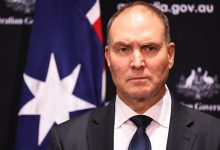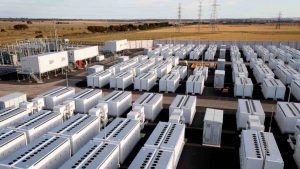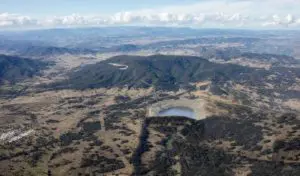The head of Scott Morrison’s handpicked National Covid-19 Commission advisory board has confirmed that it has recommended that the federal government use taxpayer funds to underwrite new gas industry infrastructure while concluding that no support is needed for renewable energy.
Responding to questions posed by a Senate committee overseeing the Morrison government’s response to the Covid-19 pandemic on Tuesday, the chair of the national Covid-19 commission advisory board Nev Power said that the body had “requested support from government” be directed towards the expansion of Australia’s gas industry, including potential agreements to underwrite new gas pipelines.
The former chief executive of Fortescue Metals Group, Nev Power, who chairs the National Covid-19 commission advisory board, had told an earlier hearing of the Senate committee that the body would not be recommending government support for the gas industry, despite leaked reports produced by its manufacturing working group that showed otherwise.
Clarifying the situation on Tuesday, Power said that the body would be recommending some forms of support, including where the government may underwrite an expansion to Australia’s gas pipeline infrastructure, by guaranteeing “offtake” agreements for extra pipeline capacity.
“Many of our gas pipelines are too small for the job that they are currently doing and that is pushing the tariffs exceedingly high and causing an increase in the cost of energy to Australian households and businesses,” Power told the senate committee.
“What we are saying is in the provision of new infrastructure that we need to be making sure that that infrastructure is the right size for any future demand.”
When queried about the lack of recommendations for support to be provided to expanding the adoption of renewable energy technologies, Power confirmed that the commission had not looked at the role of renewables in the energy system, and instead had focused on the manufacturing sector and its existing dependency on gas as a feedstock and for energy.
“Some of our recommendations were that we needed to provide more supply to reduce the cost of gas into manufacturing businesses, to maintain existing businesses and jobs that are already there in that industry and to encourage further investment and expansion in those industries,” Power said.
Power suggested that the renewable energy sector was already attracting enough private investment, and instead public funds should be directed towards gas as a “firming fuel”.
“There has been a lot of conceptual discussion around renewables and their role in the recovery, but there has been a lot less specific projects put forward,” Power said.
“There were a number of other areas that were looked at, around the advantages of using gas as a firming fuel to assist the introduction of renewables. Australia has a very large pipeline for investment in renewables, but a very small pipeline for investment in shortage and firming, because those technologies are not as well advanced,” Power added.
The recommendations have been slammed as ignoring the advice of some of Australia’s leading energy market bodies, including the Australian Energy Market Operator’s Integrated System Plan, which suggests there is no real need to expand Australia’s gas production.
“The National Covid-19 Commission Advisory Board’s push for the Australian public to subsidise more gas, a climate-heating fossil fuel, flies in the face of expert advice on our nation’s energy future,” the Australian Conservation Foundation’s Jolene Elberth said.
“The Australian Energy Market Operator’s integrated system plan confirms that Australia can rapidly move to a renewable-powered grid without the need for any new gas. The NCC Advisory Board should acknowledge the contribution gas makes to climate pollution and what impact this has on Australia’s international obligations.
A number of research organisations have presented proposals for a low emissions economic recovery to Covid-19, which uniformly find that investments in clean energy projects and energy efficiency measures would create more jobs while working to reduce Australia’s long-term greenhouse gas emissions.
The National Covid-19 Commission has delivered advice to the Morrison government without being subject to public scrutiny and has repeatedly refused to fulfil requests for documentation to be released publicly under freedom of information laws. Much of what is known about the recommendations being given to the Morrison cabinet have come by way of leaked documents.
Prime minister Scott Morrison has sought to further reduce any scrutiny by bringing the commission within the deliberative processes of the federal cabinet and reporting directly to prime minister Scott Morrison, further projecting its work from freedom of information laws.
Environmental groups have also slammed the lack of transparency, particularly given the clear preference the handpicked commission has shown towards channelling taxpayer support into the fossil fuel industry.
“It’s no surprise that a Commission stacked with gas executives is recommending policies that would waste public money on stranded gas projects and are refusing basic information to the public. Those recommendations must be rejected,” Greenpeace Australia campaigner Jonathan Moylan said.
“The admission that a gas executive is reporting directly to the Prime Minister is deeply troubling, shows a complete disregard for normal democratic checks and balances, and puts the prospects of a viable and future-facing economic recovery at risk.”







